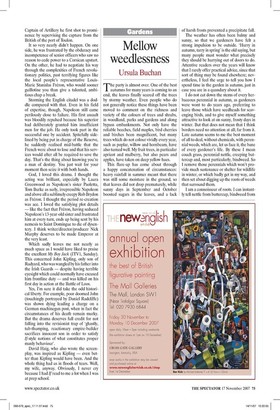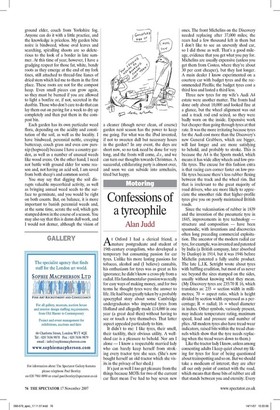Mellow weedlessness
Ursula Buchan rr he party is almost over. One of the best autumns for many years is coming to an end, the leaves finally seared off the trees by stormy weather. Even people who do not generally notice these things have been moved to comment on the richness and variety of the colours of trees and shrubs, in woodland, parks and gardens and along bypass embankments. Not only have the reliable beeches, field maples, bird cherries and birches been magnificent, but many trees which do not colour vividly every year, such as poplar, willow and hornbeam, have also turned well. My fruit trees, in particular apricot and mulberry, but also pears and apples, have taken on deep yellow hues.
This flare-up has come about through a happy concatenation of circumstances: heavy rainfall in summer meant that there was still some moisture in the ground, so that leaves did not drop prematurely, while sunny days in September and October boosted sugars in the leaves, and a lack of harsh frosts prevented a precipitate fall.
The weather has often been balmy and sunny, so that we gardeners have felt a strong impulsion to be outside. 'Hurry in autumn, tarry in spring' is the old saying, but many people must wonder what precisely they should be hurrying out of doors to do. Attentive readers over the years will know that I rarely offer practical advice, since that sort of thing may be found elsewhere; nevertheless, I feel the urge to tell you how I spend time in the garden in autumn, just in case you are in a quandary about it.
I do not cut down the stems of every herbaceous perennial in autumn, as gardeners were wont to do years ago, preferring to leave those which have seedheads for scavenging birds, and to give myself something attractive to look at on sunny, frosty days in winter. But that does not mean that I think borders need no attention at all; far from it. Late autumn seems to me the best moment of all to deal, without chemicals, with perennial weeds, which are, let us face it, the bane of every gardener's life. By these I mean couch grass, perennial nettle, creeping buttercup and, most particularly, bindweed. So I remove those perennials which won't provide much sustenance or shelter for wildlife in winter, or which badly get in my way, and then set about digging up the roots of weeds that surround them.
I am a connoisseur of roots. I can instantly tell nettle from buttercup, bindweed from ground elder, couch from Yorkshire fog. Anyone can do it with a little practice, and the knowledge is priceless. My garden bête noire is bindweed, whose oval leaves and searching, spiralling shoots are so deleterious to the look of a border in late summer. At this time of year, however, I have a grudging respect for those fat, white, bendy roots as they emerge at the end of my fork tines, still attached to thread-fine lianes of dried stem which led me to them in the first place. These roots are not for the compost heap. Even small pieces can grow again, so they must be burned if you are allowed to light a bonfire or, if not, secreted in the dustbin. Those who don't care to do that can lay them out on paving for a week to dry up completely and then put them in the compost bin.
Each garden has its own particular weed flora, depending on the acidity and constitution of the soil, as well as the locality. I have bindweed, perennial nettle, creeping buttercup, couch grass and even cow parsnip (hogweed) because I have a country garden, as well as a number of unusual weeds like wood avens. On the other hand, I need not battle with ground elder for some reason and, not having an acid soil, I am saved from both sheep's and common sorrel.
You may say that digging the soil disrupts valuable mycorrhizal activity, as well as bringing annual weed seeds to the surface to germinate, and you would be right on both counts. But, on balance, it is more important to banish perennial weeds and, at the same time, aerate the soil, which gets stamped down in the course of a season. You may also say that this is damn dull work, and I would not demur, although the vision of a cleaner (though never clean, of course) garden next season has the power to keep me going. For what was the iPod invented, if not to sweeten dull but necessary hours in the garden? In any event, the days are short now, so no task need be done for very long, and the frosts will come, d. v., and we can turn our thoughts towards Christmas. A successful, exhilarating party is almost over, and soon we can subside into armchairs, tired but happy.





































































 Previous page
Previous page